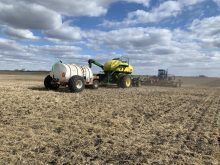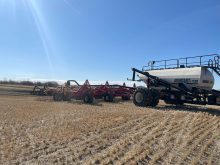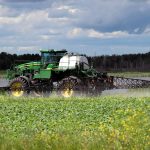Canola, looks to miss out on potential domestic demand from biodiesel until Canada clarifies its fuel mandate and offers new incentives to an already heavily subsidized industry.
Canada has finished selecting biodiesel plant proposals to receive funding from a $1.5-billion program, aiming to cut greenhouse gas emissions by 17 per cent by 2020 from 2005 levels through mandates of five per cent ethanol and two per cent biodiesel in conventional fuel pools.
None of the successful proposals are for large-scale plants in Western Canada that would use canola as the main feedstock. Canada has not set a specific start date for the 2011 biodiesel mandate that would require 500 million litres per year of renewable diesel, creating uncertainty for investors.
Read Also

CUSMA access key among other trade noise: Seeds Canada panel
Seeds Canada conference panelists say Canada needs to stay focused and wait as U.S. trade and tariff chaos develops, and a Canada-U.S.-Mexico Agreement review looms
It’s up to Canada’s Environment department to make a regulatory change that sets a start date. The fact it hasn’t yet done so has left the industry impatient, although the environment minister reassured a recent biofuels conference that the government’s commitment is intact.
In the meantime, Canada has slim prospects of turning much of the crop into biodiesel, even though the canola industry is counting on biodiesel production worldwide to account for 2.5 million tonnes, or 17 per cent of its targeted 15-million-tonne harvest by 2015.
DIVERSIFIED MARKET
Canadian canola already enjoys strong overall demand, with the Chinese appetite for vegetable oil underpinning oilseeds and keeping futures prices near two-year highs. Canola also received the green light this year for its oil to count toward the United States’ much-heftier biodiesel mandate.
But the chance to ease canola’s dependence on sometimes unpredictable export markets is appealing, with crushers like Cargill, Richardson International, Louis Dreyfus and Bunge Ltd. expanding domestic capacity.
“You can never have enough demand and this is different demand, it brings in a different buyer,” said Ward Toma, general manager of the Alberta Canola Producers.
Some biodiesel plants are able to use a variety of feedstocks, like animal fats (tallow), soybeans, used oil and canola.
That makes it important to the canola industry that plants build near Western Canada’s canola fields, said Dave Hickling, vice-president of utilization for the Canola Council of Canada.
Canola oil’s premium to competing feedstocks has limited interest in converting it to biodiesel, although canola oil is touted for its performance in cold weather.
Despite the slow start, the Canadian Renewable Fuels Association expects canolabased biodiesel production to increase as crop production grows and the seed produces higher oil content.
It projects Canada will ultimately produce 270 million litres of biodiesel out of 575,000 tonnes of canola seed. That would be about four per cent of targeted crop production by 2015.


















